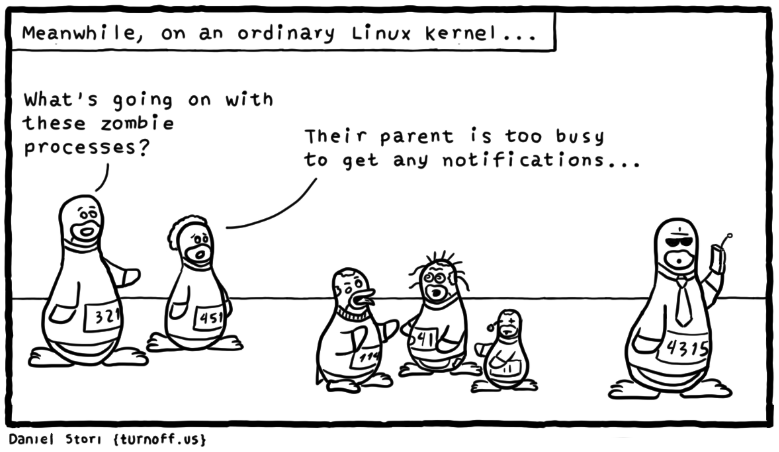Zombies and orphans
Normal topics around here.
Understand these concepts in 3 minutes.
Zombie
The process is a zombie if the child ends its execution and the parent doesn't have time to see the exit status.
Let's see an example of a zombie:
#include <stdio.h> // for standard IO functions
#include <unistd.h> // for fork and sleep
#include <sys/wait.h> // for wait lol
#include <stdlib.h> //for exit status
int main(){
pid_t pid;
int status;
if ((pid = fork()) < 0) {
perror("fork");
exit(1);
}
/* Child */
if (pid == 0)
exit(0);
sleep(100);
wait(NULL);
}
Let's now verify in action the zombie process. To try this on your own device, run on the left side of the screen zombie-code.c, and on the right side on other terminal top.

🍵 Coffee break with a meme

Orphans
The process is considered orphaned if its parent terminates before it does, without invoking wait().
How does the OS handle this?
- Cascade termination, after the dad dies, all its kids will die
- The child is reassigned to the
initprocess or the kernel (pid = 1) - Other possible variations
Let's see an example of an orphan:
#include <stdio.h>
#include <sys/types.h>
#include <unistd.h>
int main()
{
if(!fork())
sleep(30);
return 0;
}
Note that finding if a process is orphan is much harder than finding a zombie. Each OS handles in a different way this situation.
Why do we need to know all of this?
Well we should as parents wait for our children as soon as possible in the code. When the wait() occurs,
we free-up the PCB of the child. If the child terminates, and we do something in the meantime, we risk to lose the
child's BCP.